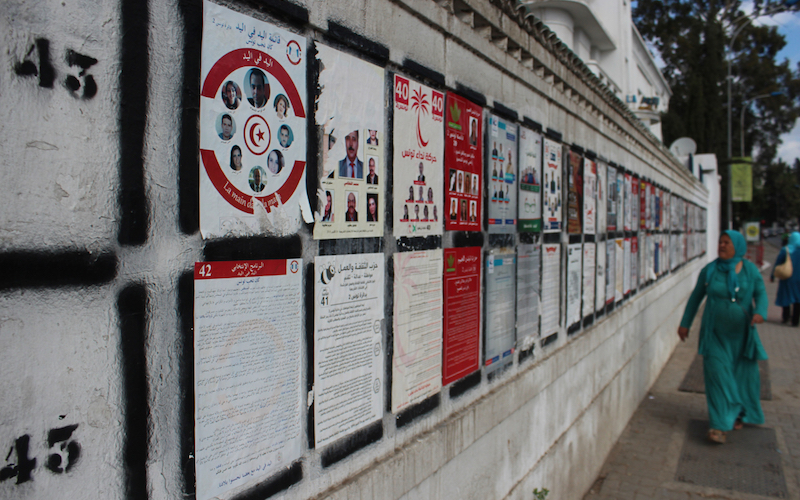
Democracy Calling, the New Tunisia
On October 27th, after years of blood-ridden post-war revolution, Tunisia embraced a historic parliamentary system, sanctioned by its near mint constitution. Only three years after the nation celebrated the fall of its longtime dictator, Zine El Abidine Ben Ali — providing the original spark that set enigmatic fire to the ‘Arab Spring’ — Tunisia’s secular opposition party, Nidaa Tounes, beat out the once-dominant Islamist party, Ennahda, to win a majority of parliament seats.
The election, praised by foreign observers on Tuesday as landmark and “free,” lights an otherwise dim and graceless four-year regional revolution. While the landmark election enumerates hope, Sunday’s elections are about much more than one country — they stand past the ashes of the ‘Arab Spring’ and signal the possibility of democracy throughout north-west Africa.
Anthony Dworkin of the European Council on Foreign Relations writes, “At a time when hopes of moving towards political reform and accountable governments elsewhere in the Arab world have been dashed, Tunisia is the only country where the aspirations of the Arab uprisings may yet be fulfilled in the near future…Even if Tunisia’s example does not inspire any immediate followers in the region, the consolidation of a successful democracy in the country would be a powerful signal that reform and political pluralism are not doomed to fail in the Arab world.”
The election prompted an amazing 60 percent participation rate from Tunisia’s 5.2 million registered voters. Officially, Ennahda won 69 to 73 seats, while Nidaa Tounes won approximately 83 seats, according to Ennahda’s former foreign minister Rafik Abdessalem. “This milestone in Tunisia’s transition to democracy exemplifies why Tunisia remains a beacon of hope, not only to the Tunisian people, but to the region and the world,” said U.S. Secretary of State John Kerry on Monday.
The Struggle
As expected, numerous challenges emerged during the election process, including: the role of religion in government and daily life, and questions regarding freedoms of speech/press. On Friday, Tunisian security forces killed six people, including five women, after a standoff with Islamist militants near the capital. Last year, two political assassinations, an incipient insurgency and rising insecurity summarized the nation’s political atmosphere. In addition, roughly 3,000 young Tunisians have reportedly joined the Islamic State to take up arms in Syria and Iraq — a disproportionally high number for such a small country — marking a delicate delineation between cultural identity and a potentially widespread security threat.
Though Tunisians are overwhelmingly Muslim, and their sympathies lie with their fellow Arabs — in particular for those suffering in conflict, whether Palestinians, Syrians or Libyans — the citizenry have sharply rejected insurgent violence at home. Particularly adherent to the situation, president of Parliament and co-founder of the Nidaa Tounes party, Beji Caid Essebsi, marketed his party’s campaign as an alternative to the creeping Islamist threat and as a powerhouse of economic progress.
The road has been tough and withstanding the chaos induced by the ‘Arab Spring’ continues to challenge new Tunisia, but its revolutionary colleagues have faired far worse — sliding into either political or civil strife, at times both sectarian and ethnic. Whereas violent polarization over the role of Islam and former government officials has tormented other nations, such as Libya and Egypt, in Tunisia rivalries were more often than not worked out at the negotiating table. Tunisia’s former parliamentary majority party, Ennahdha, deserve massive credit as they seem to have learned from two decades of repression and of democratic transitions in neighboring Algeria and Egypt.
In the coming months, expectations of the new government will be sky high, and a new parliament will have limited time to prove it can respond to challenging public demands. Polling continually shows that Tunisians expect their democracy to bring with it better economic opportunities, a better quality of life and both the freedom and stability absent from other countries in Tunisia’s neighborhood, according to the International Republican Institute. As history has proven, transitional democracies — adolescent regimes — can easily fail; especially when surrounded by ‘bad neighbors.’ Key societal issues like gender equality, lag behind. The promising nation also faces a struggle to reform state institutions as refugees pour in from the Libyan border.
While significant institutional reform remains a necessary clause, Tunisia has more going for it than most countries in the Middle East — it is small in size, has an army with no history of politics, a middle class, relies less on neocolonial ties, and is home to a relatively well-educated citizenry. It doesn’t suffer from the same sectarian and/or tribal divisions as other countries in the region.
Tomorrow
Today’s self-fulfilling political competition between the Nidaa Tounes party and Ennahda party is far more complex than a battle between enlightened secularists and backwards Islamists. Political Islam will always play a prominent role in the development of Tunisia’s near governmental future, those who discount that reality are misguided to simplify the situation. The parties are still struggling to craft vibrant political visions that speak across the generational divide.
For now, observers should applaud Tunisia for successfully holding another election and resist the tendency to claim partisan victory. In the coming months, it will be critical for developed countries to aid Tunisia in its transition — primarily to revitalize its anemic economy. Years from now, the world will look back at Tunisia and its race against time to reach stable democracy, and the question will be: did the developed world do enough to give them a chance?

